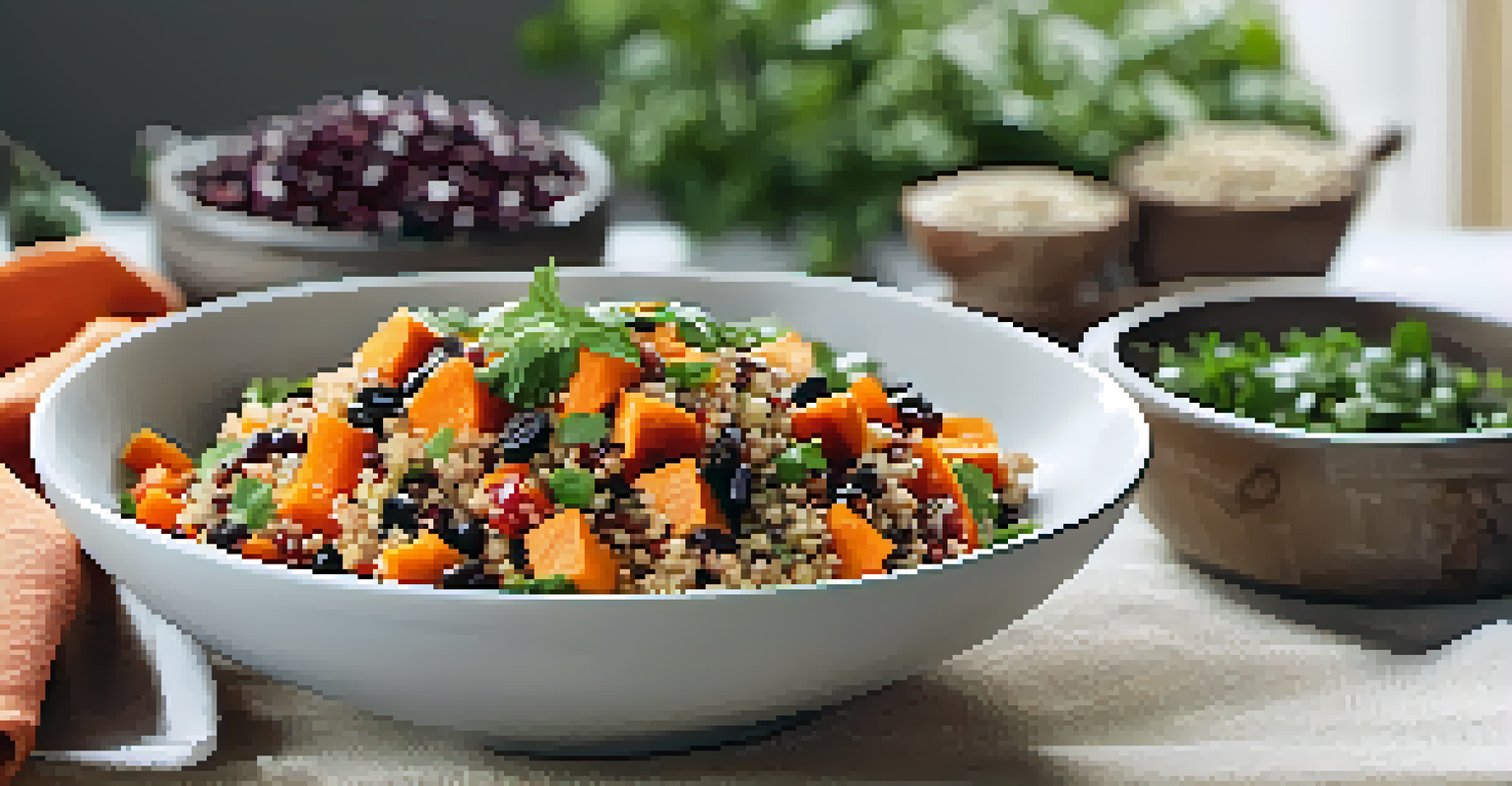Top Vegan Ingredients to Combat Diabetes and Maintain Health

Understanding the Impact of Vegan Diet on Diabetes
A vegan diet can play a significant role in managing diabetes. By focusing on whole, plant-based foods, individuals can improve insulin sensitivity and stabilize blood sugar levels. This dietary approach helps eliminate processed sugars and unhealthy fats, which are often culprits in blood sugar spikes.
Eating a plant-based diet can help you live longer, stay healthier, and feel better.
Research suggests that a vegan diet is rich in fiber, antioxidants, and healthy fats, all of which support overall health. Incorporating more fruits, vegetables, and legumes can lead to better weight management, a crucial factor in diabetes control. When you nourish your body with these foods, you may also experience increased energy levels and improved mood.
Transitioning to a vegan lifestyle can seem daunting, but it often leads to discovering a range of delicious and healthful foods. Simple swaps, like choosing quinoa over rice or snacking on nuts instead of chips, can make a big difference. Let's explore some of the top vegan ingredients that can help combat diabetes.
Chickpeas: A Versatile Protein Powerhouse
Chickpeas are not just delicious; they’re packed with protein and fiber, making them an excellent choice for anyone managing diabetes. Their high fiber content helps regulate blood sugar levels by slowing down digestion and preventing spikes. You can easily toss them into salads, soups, or even blend them into a creamy hummus.

In addition to being versatile, chickpeas are low on the glycemic index, which means they have a lesser impact on blood sugar compared to other carbohydrates. This makes them a great staple for a balanced meal, helping you feel fuller for longer without affecting your glucose levels significantly. Plus, they are rich in essential nutrients like iron and magnesium.
Vegan Diet Aids Diabetes Management
A vegan diet rich in whole, plant-based foods can enhance insulin sensitivity and help stabilize blood sugar levels.
With chickpeas, you can enjoy a variety of dishes while supporting your health. Whether you roast them for a crunchy snack or add them to your favorite curry, their adaptability makes them a kitchen staple. They’re a true friend when it comes to maintaining a healthy, diabetes-friendly diet.
Leafy Greens: Nutrient-Dense and Low-Calorie
Leafy greens like spinach, kale, and Swiss chard are nutritional powerhouses that should be a regular part of your diet. These vegetables are low in calories yet packed with vitamins, minerals, and antioxidants, which can help combat inflammation and oxidative stress. Their high fiber content also aids in blood sugar control.
Let food be thy medicine and medicine be thy food.
Incorporating leafy greens into your meals can be as simple as adding them to smoothies, salads, or stir-fries. The versatility of these greens means they can easily be blended into various dishes without overpowering other flavors. Not only do they promote better health, but they also contribute to weight management.
By eating a variety of leafy greens, you're enhancing your nutrient intake while keeping your blood sugar in check. They are a delicious and easy way to boost your meals, and with so many options available, you'll never get bored. Make these greens a staple for better diabetes management.
Berries: Sweet and Beneficial for Blood Sugar
Berries, such as blueberries, strawberries, and raspberries, are nature's candy that comes with numerous health benefits. Packed with antioxidants and vitamins, these fruits are low in sugar and high in fiber, making them a fantastic choice for those managing diabetes. They can help improve insulin sensitivity and reduce inflammation.
These vibrant fruits can be enjoyed on their own, added to smoothies, or mixed into oatmeal for a sweet touch. Their natural sweetness satisfies cravings without causing dramatic blood sugar spikes. Plus, the variety of flavors means you can enjoy a different berry every day!
Chickpeas: Low-GI Protein Source
Chickpeas are a versatile food low on the glycemic index, making them an excellent protein choice for blood sugar control.
Incorporating berries into your diet can not only satisfy your sweet tooth but also support your overall health. They’re a delicious way to enhance your meals and snacks while providing essential nutrients that help manage diabetes. So next time you're looking for a treat, reach for a handful of berries!
Quinoa: A Complete Protein Choice
Quinoa is often hailed as a superfood, and for good reason! This ancient grain is a complete protein, meaning it contains all nine essential amino acids our bodies need. For those managing diabetes, quinoa is an ideal carbohydrate source due to its low glycemic index and high fiber content, which helps regulate blood sugar levels.
Unlike many other grains, quinoa is gluten-free, making it suitable for those with dietary restrictions. It can be used as a base for salads, mixed into soups, or even enjoyed as a breakfast porridge. The nutty flavor and fluffy texture make it a satisfying addition to any meal.
By choosing quinoa over traditional grains, you’re not only diversifying your diet but also boosting your nutritional intake. It helps keep you feeling full longer, which is essential for maintaining a healthy weight. Make quinoa a staple in your pantry for a delicious and diabetes-friendly option.
Nuts and Seeds: Healthy Fats for Better Health
Nuts and seeds are packed with healthy fats, fiber, and protein, making them a great choice for those managing diabetes. They help regulate blood sugar levels and can improve heart health, which is particularly important for individuals with diabetes. Almonds, walnuts, chia seeds, and flaxseeds are among the best options.
Incorporating a handful of nuts or seeds into your daily routine can be as easy as adding them to oatmeal, yogurt, or salads. They provide a satisfying crunch and a boost of nutrients, keeping you full and energized throughout the day. Plus, they make for a convenient on-the-go snack.
Leafy Greens Boost Nutrient Intake
Incorporating leafy greens into meals enhances nutrient intake while aiding in blood sugar regulation and weight management.
However, moderation is key, as nuts and seeds are calorie-dense. Aim for a small handful each day to reap their benefits without overdoing it. By including these healthy fats in your diet, you’re taking a step towards better managing your diabetes while enjoying delicious flavors.
Sweet Potatoes: A Healthy Carbohydrate Option
Sweet potatoes are a fantastic alternative to regular potatoes, especially for those looking to manage diabetes. They are rich in fiber, vitamins, and antioxidants, which can help control blood sugar levels and improve overall health. Their natural sweetness makes them a comforting and satisfying food choice.
Unlike white potatoes, sweet potatoes have a lower glycemic index, meaning they cause a slower rise in blood sugar levels. You can enjoy them roasted, mashed, or even as a base for delicious veggie bowls. Their versatility allows them to fit into numerous meals while providing essential nutrients.

Incorporating sweet potatoes into your diet not only adds flavor but also provides a wealth of health benefits. They’re a wholesome carbohydrate option that keeps you feeling full and satisfied. So, make sweet potatoes a staple side dish for a diabetes-friendly meal plan.
Embracing a Vegan Lifestyle for Diabetes Management
Transitioning to a vegan diet can be a rewarding journey toward better health, especially for those managing diabetes. By focusing on whole, plant-based foods, you can improve your overall well-being while enjoying a variety of flavors and textures. It’s all about making mindful choices that nourish your body.
As you explore vegan ingredients, stay open to trying new recipes and experimenting with flavors. Cooking with plant-based foods can be fun and creative, leading to delicious meals that support your health goals. With a little planning, you can create balanced meals that satisfy your cravings and nourish your body.
Ultimately, embracing a vegan lifestyle can empower you to take charge of your health while managing diabetes. By incorporating these top vegan ingredients, you’re making a positive choice that impacts your long-term well-being. So, dive into the world of plant-based eating and enjoy the journey!